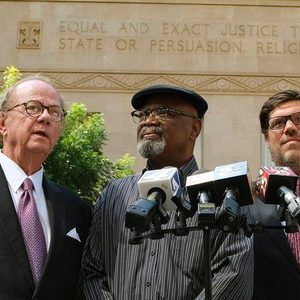MORE STAYS GRANTED On October 24, the U.S. Court of Appeals for the 11th Circuit granted a stay of execution to Daniel Siebert, who was to be executed in Alabama on Oct. 25. On Oct. 22, the Georgia Supreme Court granted another stay, this time to Curtis Osborne. These stays are related to the issue of lethal injection as the U.S. Supreme Court considers the matter.
“A MATTER OF LIFE OR DEATH:” NEWS SERIES REVEALS ARBITRARY DEATH PENALTY IN GEORGIA
According to “A Matter of Life or Death,” a recent four-part news series published by the Atlanta Journal-Constitution, Georgia’s death penalty is “as predictable as a lightning strike.” Based on an investigation of 2,328 murder convictions in Georgia between January 1, 1995, and December 31, 2004, the paper determined that the state’s capital punishment system is unfairly shaped by racial and geographic bias, and fails to reserve the death penalty for “the worst of the worst.”
The AJC reporters worked with University of Maryland criminologist Ray Paternoster to examine the cases. Though their investigation determined that 1,315 of these cases involved crimes that made defendants eligible for the death penalty, prosecutors sought it in only 25% of those cases. Of those that faced a capital trial, only 1 in 23 was sentenced to death. “It’s like a roulette wheel. Arbitrariness is a weakness of the death penalty,” observed former Georgia Chief Justice Norman Fletcher.
Among the key findings of the investigation were the following:
- Race Matters: Statewide, prosecutors were twice as likely to seek the death penalty in cases where the victim was white. The study also revealed that between 1995 and 2004, prosecutors were about six times more likely to seek death when an armed robber killed a white person.
- Geography Matters: Decisions on whether to seek the death penalty are often determined by where the crime was committed. For example, a murder in Clayton County was found to be 13 times more likely to bring a death penalty prosecution than a similar crime a few miles away in Fulton County.
- Nature of the Crime Matters: Throughout Georgia, geographic and racial disparities were more pronounced in prosecutors’ handling of murders that involved armed robbery. Of the 132 murderers researchers identified as making up the worst 10% of death penalty cases — because their cases involved heinous crimes such as torture, multiple victims or rape — only 29 received the death penalty. Fifty of these defendants avoided the death penalty by pleading guilty in exchange for receiving a life sentence.
- Georgia’s Supreme Court has repeatedly cited cases that had been overturned on appeal to justify other death sentences. According to the study’s examination of 159 death penalty rulings by the state Supreme Court since 1982, 80% of cases of cases cited at least one overturned case. In more than a third of the decisions, 25% of the cited sentences had been overturned. Another 16 rulings contained citations that were reversed afterward. Only 14 rulings cited no reversed cases.
- Juries are rejecting death sentences in favor of life without parole. Since 2000, juries have decided against death in two of every three sentencing trials. The trend makes each remaining death sentence more out of step with punishment for similar crimes. The report notes that one reason prosecutors in Georgia are choosing not to seek death is that juries will not impose it unless guilt is irrefutable.
- The high cost of the death penalty contributes to its arbitrariness. Many prosecutors note that seeking a death sentence in a case where there is not certainly of a conviction is a waste of valuable resources on long-drawn-out court proceedings and years of appeals. In addition to concerns about the cost of capital punishment, prosecutors noted that they will often decide to not seek a death sentence because a victims’ family opposes the punishment, a defendant’s mental state is in question, or the individual agrees to cooperate with prosecutors to convict a co-defendant. Muscogee District Attorney John Gray Conger observed that these reasons and the high costs of the death penalty can play a role in the decision to offer defendants a sentence of life without parole. He said, “That’s the unfortunate truth. It costs a lot of money to try a death case. It takes a lot of resources. It takes a lot of people.”
(Atlanta Journal-Constitution, September 22 – 25, 2007). Read the Series. See Arbitrariness, Costs, and Race.
Arbitrariness
Nov 05, 2024


